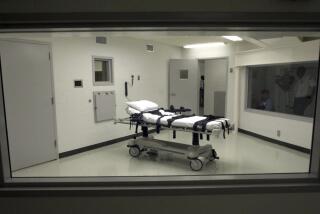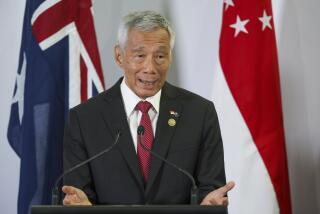Chief of oil spill inquiry sees no proof BP skimped on safety to save money
The chief attorney for the presidential panel investigating the gulf oil spill said Monday that he had found no proof that BP sacrificed safety to save money as it drilled its Macondo well, contradicting earlier assertions made in other government investigations of the disaster.
“To date, we have not seen a single instance where a human being made a conscious decision to favor dollars over safety,” general counsel Fred H. Bartlit Jr. told the panel during a lengthy presentation on the causes of the April 20 rig explosion in the Gulf of Mexico. It killed 11 workers and triggered the worst offshore oil spill in U.S. history.
Elizabeth Ashford, a BP spokeswoman, declined to comment. But Bartlit’s pronouncement was a rare public relations plus for the British oil giant, which has been pummeled by bad publicity and public outrage — as well as a morass of civil litigation and a Justice Department criminal inquiry.
It’s not clear, however, whether Bartlit’s assessment will be a harbinger of relief for BP in the legal arena. David Uhlmann, a law professor at the University of Michigan who formerly headed the Justice Department’s environmental crimes section, said that in general, the numerous civil cases against BP — as well as any future criminal case — might not require “smoking gun” documents to succeed.
Instead, Uhlmann said, those cases could turn on such questions as, “What was the corporate culture? And how did that influence decisions about what risks to take and what corners to cut?”
Bartlit said his investigative team agreed with “90 percent” of BP’s September report on the causes of the explosion. The 193-page BP investigation concluded that a series of mechanical and human failures by its crew and contractors led to the disaster, including an incorrectly read pressure test, a blowout preventer that failed and a faulty well-cement job.
While BP accepted a share of responsibility, it also took aim at contractors Transocean Ltd. and Halliburton. Transocean derided the BP report as “self-serving,” and Halliburton called it inaccurate.
Created by President Obama a month after the Deepwater Horizon explosion, the commission is investigating the causes of the disaster and developing recommendations for preventing oil spills and cleaning them up. The findings will guide new laws and regulations on offshore drilling.
Bartlit’s presentation came more than a week after he wrote a letter to the commission outlining how BP and subcontractor Halliburton were aware of some test results that showed the cement used in the well might have been unstable.
He told the panel Monday that he had not investigated the blowout preventer, which is in federal custody. He said he was awaiting the results of an analysis of the giant device, designed to seal a well in an emergency, being conducted by a Norwegian accident forensics firm.
Some attorneys representing clients with civil cases against BP said Monday that they believed Bartlit’s findings that cost did not trump safety decisions were only part of the story because the presidential commission does not have the power to subpoena documents.
In a statement Monday, James P. Roy and Stephen J. Herman, members of the four-lawyer executive committee coordinating the hundreds of spill-related cases in federal court in New Orleans, said BP, as well as rig owner Transocean and cement contractor Halliburton, “routinely chose ‘quick and cheap’ over ‘safe and prudent.’ ”
“The tragic result, for which BP, Halliburton and Transocean must be held fully accountable is 11 dead, a region’s economy and ecosystem in shambles — and rogue corporations continuing to place profits over safety,” they said.
That general argument echoes one made in June by Reps. Bart Stupak (D-Mich.) and Henry A. Waxman (D-Beverly Hills), who, after some investigation, sent a letter to BP in June stating that the company “appears to have made multiple decisions for economic reasons” that increased the chances of disaster.
Waxman’s and Stupak’s offices did not return calls for comment Monday.
The suggestion that BP favored dollars over safety was also made during the summer by federal investigators as part of joint Coast Guard and Interior Department hearings.
Testimony illustrated the financial and time pressures BP was under to finish the exploratory phase of the drilling, which included sealing the well and moving the floating rig to a different site. Drilling was six weeks behind schedule, costing BP at least $21 million in leasing fees alone.
Among the procedures the company chose not to conduct was an $118,000 integrity test of the well’s cement plug. BP also did not perform a circulation test that could have better prepared the well for cementing, which affixes the well casing to adjoining rock and fills gaps through which oil and gas could flow uncontrolled.
Investigators also referred to a decision not to use a well liner that would have been another barrier to prevent natural gas from erupting from the well.
Although internal BP e-mails cited the time it would take to install the liner, as well as the $7 million to $10 million it would cost, BP team leader John Guide testified that cost-cutting was not a factor.
Bartlit gave his presentation on the first day of a two-day hearing in Washington in which he and his team sought to answer some important questions while posing new ones.
For instance, Bartlit said his investigation indicated that the explosion probably occurred because oil and natural gas blew through the cement at the bottom of the well and shot straight up the drill pipe, rather than on the outside of the pipe, bolstering BP’s argument that a decision to use fewer protective devices on the sides of the well did not lead to the explosion.
richard. fausset@latimes.com
Banerjee reported from Washington and Fausset reported from Atlanta
More to Read
Start your day right
Sign up for Essential California for news, features and recommendations from the L.A. Times and beyond in your inbox six days a week.
You may occasionally receive promotional content from the Los Angeles Times.







